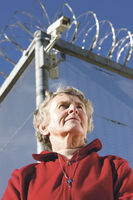Former prison chaplain, Sr Josepha O’Connor RSJ, in reflecting on her time caring for the inmates in three Wellington prisons, says more rehabilitation and education rather than longer sentences will help reform prisoners.
‘No one ever reformed through severity. It is surprising the number of prisoners who can’t read or write very well – or at all. While walking among the prisoners with the ‘listening heart’ required of a chaplain, one of the most frequent requests is to read a letter for them, to write a letter for them, or to correct the spelling in a letter they have written,’ Sr Josepha told the congregation at Mt Victoria during Social Justice Week in September.
 The Caritas booklet for SJ week quotes Pope John Paul II ‘prisons should be places of redemption where people can turn their lives around’.
The Caritas booklet for SJ week quotes Pope John Paul II ‘prisons should be places of redemption where people can turn their lives around’.
There are 25 Catholic chaplains in New Zealand working alongside ecumenical chaplains in the prison service.
Always in the chaplain’s mind is the knowledge that God does not give up on anyone – forgiveness is available to all. Without condoning the offending which has brought a person to prison, the chaplain is there on hand to be a friend, an advocate and to offer a listening ear especially when God puts into the heart of a prisoner the desire to change.
Quoting the 11 th century German mystic, Hildegard of Bingen, who talked of Christ bringing lush greenness to shrivelled and wilted people and institutions, Sr Josepha recalled a young man, aged 18, sentenced to Mt Crawford (now Wellington Prison) for a long period− more than 10 years. He arrived there shocked, traumatised, seemed not to be able to speak properly, or didn’t choose to speak, didn’t respond to anyone and here he was at 18 in among rough, tough criminals, some 10, 20, 30 years his age.
After many months, there were a few signs that he was ‘thawing’ a little as the men around him seemed to be ‘taking him under their wing’. They were relating to him in a way which they didn’t usually with one another, being patient and gentle – not rough and tough. They were looking after him, teasing him (in a good way). Maybe it was pity – but they were helping him back to life and he was ‘unfolding’. He began to smile, respond and interact. This happened over some five years or more as he worked in the prison laundry.
Then came a ray of light – he was appointed to work in the print shop, which is a heaven on earth at Wellington prison − only the reliable and trustworthy seem to be appointed to the print shop which is outside the high prison walls, and down the hill a short way overlooking Miramar, the airport and Evans Bay. About 20 prisoners operate the printing machines, photography, design, developing, computer and packing departments.
At the print shop the men become themselves. For eight hours of the day they are not prisoners, they’re learning a trade. It was at the print shop that I noticed the biggest change in this young man. He flourished, worked well, conversed knowledgeably about his work and was very happy. He’d grown from a traumatised, speechless 18-year-old to a confident, pleasant, well spoken young man in his mid-20s.
Whenever I visited the print shop he would invite me to the homely kitchen for a cup of tea. This seemed to give him great pleasure – as it did me – but what interested me most was the way he always pulled out the chair from the table for me to sit down. I used to wonder where he learnt this gentlemanly act − certainly not in prison. Maybe his father did it for his mother in the grim old prison visiting hall where they came every Saturday over the years of his imprisonment.
The next big step for this young man will be release – which must be not too far away. Will there be an employer who will give him a chance, a young man with a long prison sentence behind him? Or will our society act with vindictiveness and choose to continue his punishment by making it almost impossible for him to return to the workforce?
To return to Hildegard’s words – I think Christ incarnate is bringing lush greenness into this young man’s life and I think Christ incarnate worked through the kindness of the rough, tough prisoners who looked out for him when he first came into their prison wing as a broken and traumatised teenager.